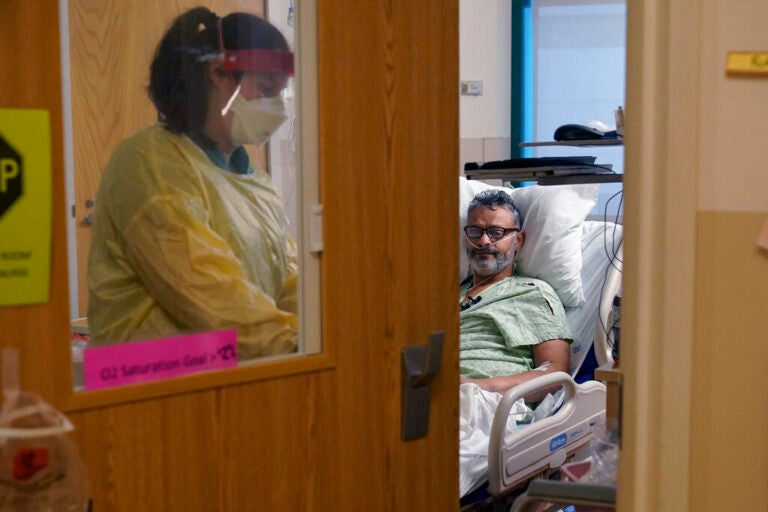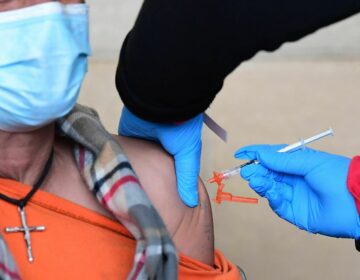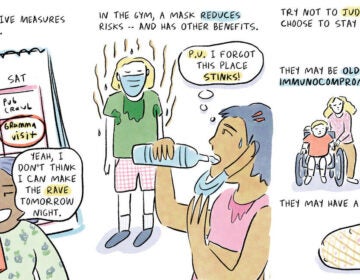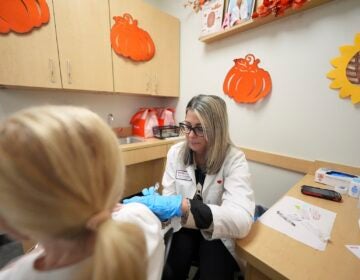COVID and flu cases are on the rise as vaccination rates remain low, CDC warns
Experts are concerned that the number of flu and COVID-19 patients in hospitals could peak at around the same time and strain capacity.

File photo: Registered nurse Rachel Chamberlin, of Cornish, N.H., left, departs the room of COVID-19 patient Fred Rutherford, of Claremont, N.H., right, at Dartmouth-Hitchcock Medical Center, in Lebanon, N.H., Monday, Jan. 3, 2022. (AP Photo/Steven Senne)
From Philly and the Pa. suburbs to South Jersey and Delaware, what would you like WHYY News to cover? Let us know!
More people are getting sick with COVID-19 and the flu again.
Earlier in December, the Centers for Disease Control and Prevention warned that from mid-November onwards, more people of all ages got sick enough from COVID-19, flu, and RSV to end up in a hospital. The CDC also noted that vaccination rates are low, so more people could end up severely ill and strain hospital capacity.
While the situation has yet to reach the “tripledemic” season from last winter, some hospitals in New York, Wisconsin, and Washington State are requiring visitors to wear masks again, to try and prevent these respiratory illnesses from spreading.
Starting in 2020, when COVID-19 was still a major concern and more people wore masks and stayed away from crowds, the usual winter diseases like flu did not spread as much. But now that those measures are not as common, the flu season is most likely back to normal, said Dr. Judith O’Donnell, director of infection prevention and control at Penn Presbyterian Medical Center.
“This is probably the most numbers of flu cases we’ve seen in the community in many years at this point, so I think we’re on track for having a more traditional flu season,” she said.
O’Donnell said that before the pandemic, flu cases would typically increase in December and peak in January.
Main Line Health has also seen a lot more patients who are sick with flu, said Chief Medical Officer Jonathan Stallkamp.
He added that the flu usually kills tens of thousands of people in the U.S. per year, so it is not a disease to be taken lightly.
“If you’ve ever had flu, it is like getting hit by a truck,” he said. “You feel horrible. It is not like your … typical nose cold where you’re blowing your nose for … a couple days and maybe I’ll just be better the next day. You can be out … for days.”
Fortunately, so far, the situation is not as bad as it was last winter, when there were record numbers of COVID-19, RSV or respiratory syncytial virus, and flu patients at the same time, said Dr. Ericka Hayes, senior medical director of infection, prevention, and control at the Children’s Hospital of Philadelphia.
“COVID-19 remains an unpredictable wild card,” she said. “It may do nothing or we may see … a surge in January not unlike what we saw in January of ’22 with the omicron surge. So I think the thing that worries and concerns me the most is the fact that we can’t know.”
Hayes said the number of RSV cases at CHOP peaked in late November, and is starting to decrease. While the CDC alerted health care providers about low vaccination rates for COVID-19, flu, and RSV, she noted that there was also an issue with the supply of RSV vaccines earlier this year.
So far, the biggest concern is that the number of flu and COVID-19 patients in hospitals could peak at around the same time and strain capacity, said Dr. Cheryl Bettigole, Philadelphia’s health commissioner.
“The newer variants that are circulating don’t appear to be worse. They don’t appear to be more likely to put people in the hospital,” she said. “But … you get enough virus circulating, you’re going to see large enough numbers that hospitalization rates could go up. And … staffing for hospitals can be a challenge as these viruses circulate because … the hospital personnel can’t work if they themselves are sick.”
Bettigole and the other experts say people should get vaccinated if they have yet to do it, and wear a mask and stay away from other people if they feel sick.
There’s no need to refrain from socializing as long as people can do it safely, said Dr. Edward Lifshitz, medical director for the communicable disease service at the New Jersey Department of Health.
“Socialize. Be around people … be with family and loved ones and others, but also be aware that the virus isn’t taking a holiday.”

Get daily updates from WHYY News!
WHYY is your source for fact-based, in-depth journalism and information. As a nonprofit organization, we rely on financial support from readers like you. Please give today.





![CoronavirusPandemic_1024x512[1]](https://whyy.org/wp-content/uploads/2020/03/CoronavirusPandemic_1024x5121-300x150.jpg)



